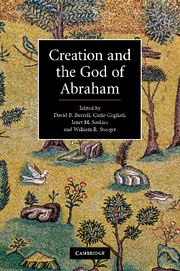Book contents
- Frontmatter
- Contents
- Contributors
- Preface
- Introduction
- 1 Creation ex nihilo: early history
- 2 Creatio ex nihilo: its Jewish and Christian foundations
- 3 The act of creation with its theological consequences
- 4 Scotistic metaphysics and creation ex nihilo
- 5 Creation and the context of theology and science in Maimonides and Crescas
- 6 Creation: Avicenna's metaphysical account
- 7 Four conceptions of creatio ex nihilo and the compatibility questions
- 8 Will, necessity and creation as monistic theophany in the Islamic philosophical tradition
- 9 Trinity, motion and creation ex nihilo
- 10 The Big Bang, quantum cosmology and creatio ex nihilo
- 11 What is written into creation?
- 12 Creatio ex nihilo and dual causality
- 13 God and creatures acting: the idea of double agency
- 14 Thomas Aquinas on knowing and coming to know: the beatific vision and learning from contingency
- Index
- References
14 - Thomas Aquinas on knowing and coming to know: the beatific vision and learning from contingency
Published online by Cambridge University Press: 07 September 2010
- Frontmatter
- Contents
- Contributors
- Preface
- Introduction
- 1 Creation ex nihilo: early history
- 2 Creatio ex nihilo: its Jewish and Christian foundations
- 3 The act of creation with its theological consequences
- 4 Scotistic metaphysics and creation ex nihilo
- 5 Creation and the context of theology and science in Maimonides and Crescas
- 6 Creation: Avicenna's metaphysical account
- 7 Four conceptions of creatio ex nihilo and the compatibility questions
- 8 Will, necessity and creation as monistic theophany in the Islamic philosophical tradition
- 9 Trinity, motion and creation ex nihilo
- 10 The Big Bang, quantum cosmology and creatio ex nihilo
- 11 What is written into creation?
- 12 Creatio ex nihilo and dual causality
- 13 God and creatures acting: the idea of double agency
- 14 Thomas Aquinas on knowing and coming to know: the beatific vision and learning from contingency
- Index
- References
Summary
INTRODUCTORY REMARKS
Accounts of the history of science sometimes treat Thomas Aquinas as if he were someone interested in what we would now call natural science, but not very good at it. He does not advance an experimental method, and he is captive to Aristotle's notion of insight, or epagoge. But Aquinas is clearly not someone who is much interested in natural science. He is not trying to carry out any experiments. He is not even trying to learn natural science in some other way, say by following the Posterior Analytics. Rather, he is supremely interested in human growth, in ethics, and therefore also in how human beings learn. He is interested in the beatific vision, in knowledge as a metaphor for complete happiness. And he is interested in the quite odd way (the incarnation) in which God graciously creates a continuity between those two discontinuous things, learning in this life and knowing in the next. Learning in this life means learning from contingency. Knowing in the next life means seeing with God's own vision. They belong together only by a marvelous exchange: God enters contingency, that humans may enter beatitude; God learns, that humans may see. This is decidedly a theology of science, not a philosophy. You would not try to learn about the atom from Kuhn, or the history of science from Bohr.
- Type
- Chapter
- Information
- Creation and the God of Abraham , pp. 238 - 258Publisher: Cambridge University PressPrint publication year: 2010
References
- 1
- Cited by

